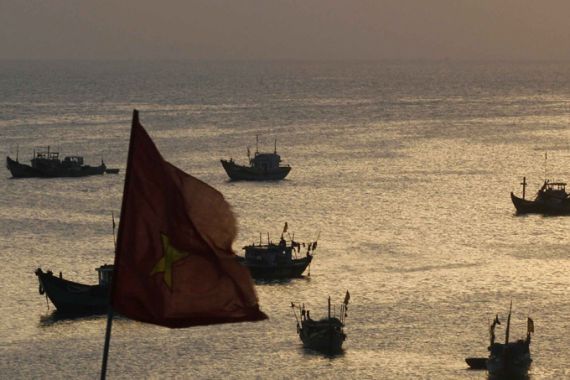Philippines to take China sea row to court
Manila invoked a UN treaty on territorial limits of coastal states in their dispute with Beijing over South China Sea.

The Philippines has formally sought international arbitration against China’s claims to terrirtories in the potentially oil-rich waters of the South China Sea, as “unlawful”.
Albert del Rosario, Filipino foreign secretary, said at a news conference on Tuesday that his office had summoned the Chinese ambassador to notify Beijing that Manila will bring both countries’ conflicting claims over the territories to a tribunal operating under the 1982 United Nations Convention on the Law of the Sea.
“The Philippines has exhausted almost all political and diplomatic avenues for a peaceful negotiated settlement of its maritime disputes with China,” del Rosario said. “To this day, a solution is still elusive.”
There are six governments with overlapping claims across the vast South China Sea. China claims it has sovereignty on virtually all of it.
Chinese paramilitary ships confronted Philippine vessels last year in a months-long standoff over a shoal that both countries claim.
Ma Keqing, Chinese ambassador to the Philippines, reiterated that “China has indisputable sovereignty over the islands in the South China Sea and its adjacent waters”.
The ambassador stressed that the disputes should be settled by the rival claimants through one-on-one negotiations.
China, the Philippines’ third-largest trading partner, has opposed attempts to involve third parties or world bodies in the South China Sea disputes.
The Philippines hopes that arbitration through an international tribunal would lead to a ruling that China’s sprawling claims violate the United Nations Convention on the Law of the Sea, or UNCLOS.
China and the Philippines are among more than 160 countries that have ratified the accord, which aims to govern the use of offshore areas and sets territorial limits of coastal states.
Del Rosario said the Philippines hopes the tribunal would order China to “desist from activities that violate the rights of the Philippines in its maritime domain.”
Non-binding arbitration
But even if a tribunal ruled against China, Beijing could opt to simply ignore the ruling.
Chen Shaofeng, an international affairs expert at Peking University, said no arbitration should proceed unless both parties approve it. He said it is unlikely that Beijing would agree to such a process, or accept the results of a tribunal it did not recognise.
“There is no precedent in Chinese history of China allowing international arbitration on territorial disputes no matter over land or waters,” said Chen. “The Philippines knows its proposal for arbitration will get nowhere in the end, but it just wants to make the issue more internationalized.”
Filipino diplomats, however, argue that the arbitration can proceed even without China’s involvement.
In the note handed by Filipino diplomats to the Chinese ambassador, the Philippines listed several aggressive moves it alleged were launched by China in recent years to fortify its territorial claims, including the occupation of South China Sea islands and the enactment of a Chinese law that would allow Chinese patrol vessels to block and board foreign ships passing through vast stretches of waters that Beijing claims.
In June, after months of standoff, China wrested control of what it calls Huangyan island, and what the Philippines calls Scarborough Shoal, without firing a shot.
With a typhoon approaching, both sides agreed to withdraw their ships. But China quickly returned and strung up a cable across the lagoon to keep Philippine vessels out.